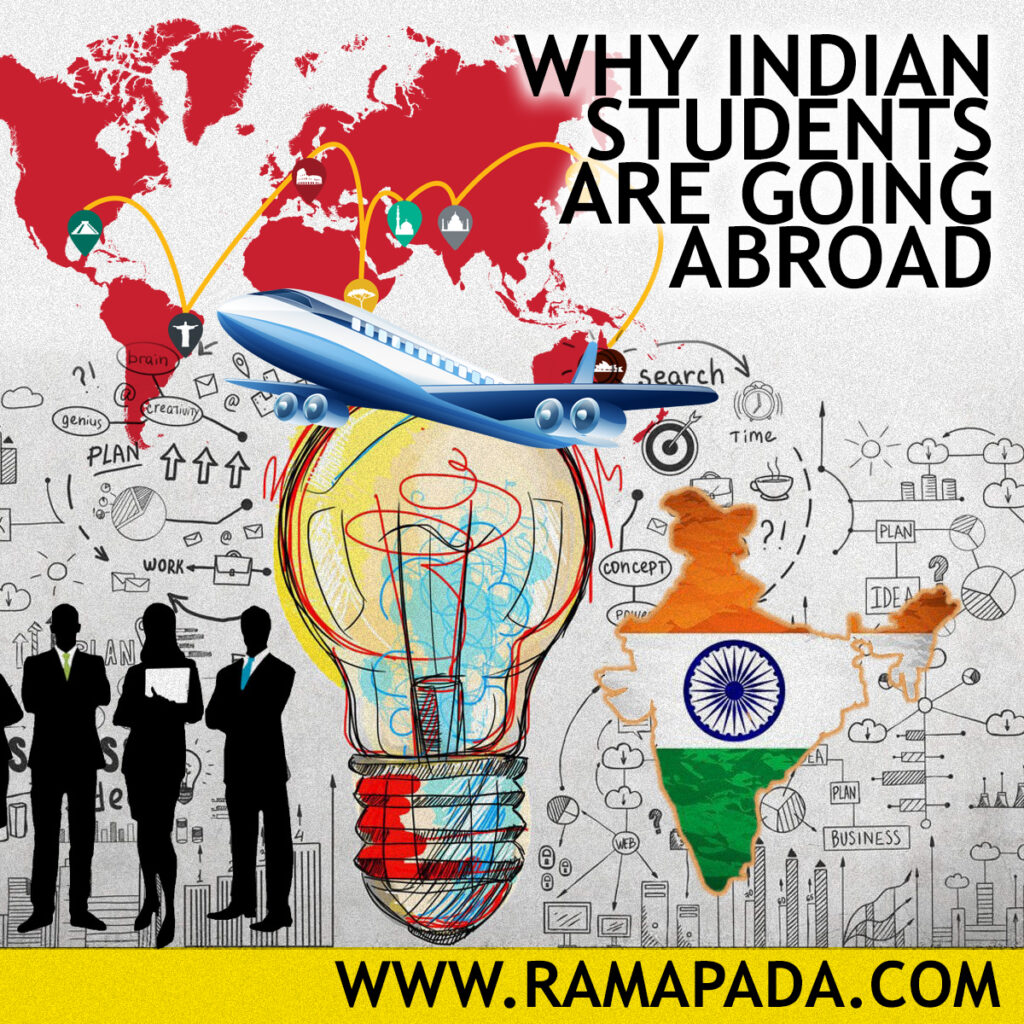The desire for a brighter future is driving a surge in Indian students seeking education abroad. While Indian students are going abroad, there can be drawbacks to this path compared to studying in India. We have to identify these problems and solve them, so that they will prefer studying in India to studying abroad.
What Are the Problems That Students Go Study Abroad?
- Quality And Relevance Of Education:- The curriculum may not always be up-to-date with industry needs, with a focus on rote learning over practical skills and critical thinking. In total, 13 lakh Indian students went abroad to study.
- Limited Seats Into Universities:- Competition for admission into prestigious Indian institutions is fierce, and there may not be enough seats to accommodate all deserving students.
- Uneven Infrastructure:-Resource distribution across universities can be uneven, with some institutions lacking proper infrastructure or research facilities.
- Focus On Exams:-The high-pressure exam-centric system can create stress and discourage a well-rounded learning experience.
- Cost And Accessibility:-While generally less expensive than studying abroad, educational costs can still be a burden for some students, especially when considering factors like accommodation.
Why Indian Students Want To Study In Abroad?
Indian students want to study abroad as they aim to equip themselves for a successful future.
Here, are some of the points:
- Enhanced Education And Specialization: Top universities abroad offer access to world-renowned faculty, cutting-edge research, and specialized programs that may be limited in India. This focus on specific fields can give them a competitive edge in the global job market.
- Improved Job Prospects: An international degree holds significant weight for many Indian employers. The well-rounded skillset and global perspective gained through studying abroad can translate to better career opportunities and potentially higher salaries.
- Personal and Professional Growth: Studying abroad fosters independence, adaptability, and intercultural communication skills. Students gain exposure to diverse cultures and ways of thinking, broadening their horizons and preparing them for success in an interconnected world.
- Building A Global Network: International universities provide opportunities to connect with students and faculty from around the world. These networks can be invaluable resources for future careers and personal growth.
- Financial Considerations:- While studying abroad can be expensive, scholarships and financial aid programs specifically for international students can ease the burden. Additionally, some countries offer post-study work visas, allowing graduates to gain valuable work experience.
What are their problems? Why are Indian students are Going Abroad to study other than those in India?
- Focus on Rote Learning: The Indian education system can be criticized for emphasizing rote memorization over practical application and critical thinking skills. Studying abroad can expose students to more interactive and research-oriented learning methods.
- Competition for Seats: Getting into top Indian universities can be incredibly competitive, with limited seats for a large student population. Studying abroad can provide a wider range of options for qualified students.
- Uneven Infrastructure: Resource distribution across Indian universities can vary greatly. Some institutions may lack proper infrastructure or research facilities compared to universities abroad.
Benefits of Studying Abroad:
- Enhanced Reputation: A degree from a prestigious international university can hold significant value in the Indian job market, which is potentially leading to better career prospects.
- Global Exposure:-Studying abroad fosters independence, intercultural communication skills, and broader world views. This exposure can be invaluable in today’s interconnected world.
- Potential for Scholarships: Many universities abroad offer scholarships and financial aid programs specifically for international students, making studying abroad more accessible.
- Post-Study Work Opportunities: Some countries with popular study destinations offer post-study work visas, allowing graduates to gain valuable international work experience.
What are their lacks in India than abroad that’s why Indian Students Are Going Abroad?
- Curriculum And Specialization:-Indian universities might not offer the specific or cutting-edge programs students desire, especially in niche fields. Foreign universities often have a wider range of specialized programs that align better with career aspirations.
- Role Learning vs. Practical Skills:-The Indian system can be criticized for emphasizing memorization over practical application and critical thinking. Studying abroad can expose students to more interactive and research-oriented learning methods that equip them with practical skills valued by employers.
- Competition And Infrastructure:- Getting into top Indian universities can be incredibly competitive due to limited seats. Uneven resource distribution across universities can mean some lack proper infrastructure or research facilities compared to universities abroad.
Solutions:-
- Increase In Investment:-Allocate more resources to improve infrastructure, labs, libraries, and research facilities across universities.
- Invest In Faculty Development:-Provide training programs and opportunities for faculty to stay updated with advancements in their fields.
- Attract And Retain Top Talent:- Offer competitive salaries and benefits to attract and retain high-quality faculty members.
- Promote International Collaborations:-Encourage student and faculty exchange programs with prestigious universities abroad to enhance global recognition.
- Promote Research Collaborations:-Encourage partnerships between universities and research institutions in India and abroad to foster a vibrant research environment.
- Offer Specialized Programs:-Develop a wider range of specialized programs in emerging fields to cater to diverse student interests and career aspirations.
- Increase Government Scholarships:- Offer more scholarships and financial aid programs to make higher education more accessible to deserving students.
- Explore Alternative Funding Models:-Look into public-private partnerships or alumni funding opportunities to supplement educational resources.
- Promote Online Learning:-Develop high-quality online learning platforms to provide flexible and affordable educational opportunities.
- Consider Holistic Admissions:-Move beyond relying solely on entrance exams. Integrate factors like extracurricular activities, portfolios, and interviews for a more well-rounded evaluation.
- Reduce Exam Pressure:- Explore alternative assessment methods to decrease the stress associated with high-stakes entrance exams.
Conclusion:–
We need to take care some of the reasons, which have to be taken care so that Indian students will not go abroad for study. They will stay in India to study.
These are some of the reasons which we have to improve:-
- Better Academic Opportunities,
- Enhanced Career Prospects,
- Overall Development,
- Immigration Pathways.

